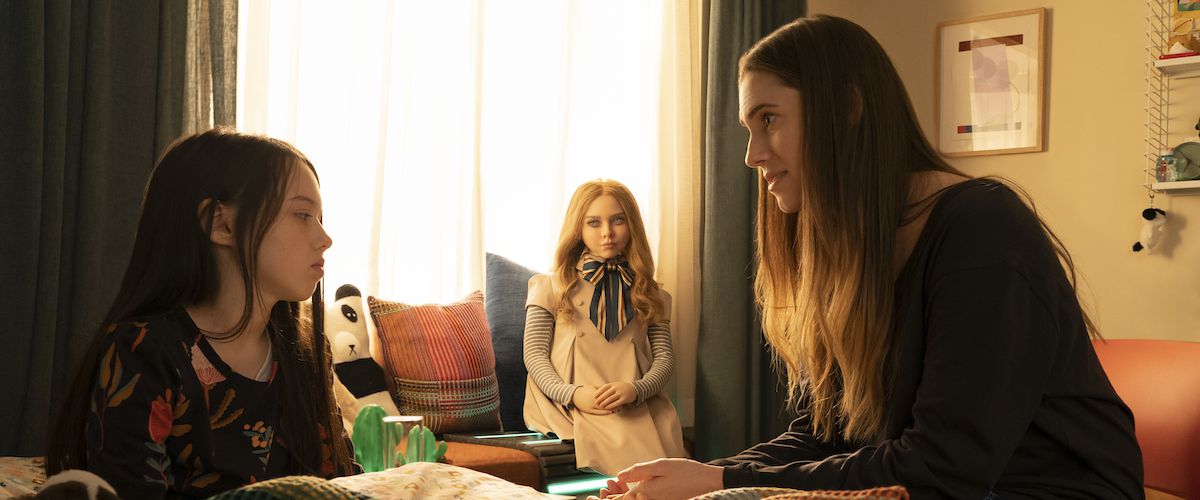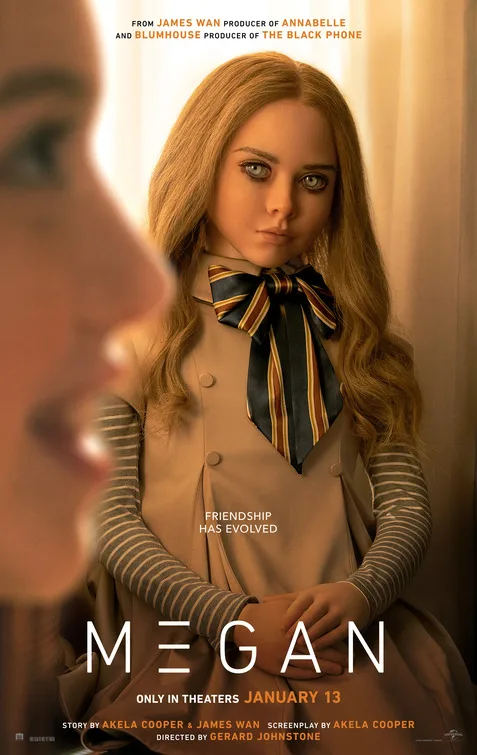The marketing for "M3gan" has leaned into the uncanny spectacle of the title character, a four-foot-tall cyborg with big doe eyes, a ratty wig, and the wardrobe of a closeted lesbian headmistress in a '50s melodrama. And it seems to be working: A well-placed GIF here, an activation with a half-dozen women in M3gan drag there, and Blumhouse—always expert at creating buzz—has generated more interest in "M3gan" than there's been for the last five horror films dumped into the bleak theatrical landscape of early January. But the company could have gone another route as well. In case you haven't heard, this film comes to you from the writer of "Malignant."
For that film, James Wan directed a script by Akela Cooper, a longtime TV writer with a sideline in horror screenplays. The duo perfectly calibrated the movie's blend of haunted-house scares and outrageous grotesquerie, enough to make "Malignant" a viral hit when it was released on HBO Max in the fall of 2021. Now Cooper is a horror screenwriter who also works in television, and she's been brought into the Blumhouse fold to develop a sequel to the "Conjuring"-verse spin-off "The Nun" as well as writing "M3gan" from a story by herself and Wan.
Like "Malignant," "M3gan" knows it's ridiculous. It fills a kiddie pool with ridiculousness and splashes around in it. Cooper's screenplay for "M3gan" is more overtly comedic than "Malignant," however, and has a more populist type of appeal as a result. (The audience at a Chicago preview of the film went crazy for it.) The themes are your classic "science gone amok" fare seen in everything from "Frankenstein" to "Jurassic Park," combined with a more modern throughline exploring anxieties about motherhood and filtered through the knowingly silly lens of the "tiny terrors" subgenre. "Child's Play" is the most famous example of that last category, and many comparisons have been and will be made between M3gan (an acronym for "Model 3 Generative ANdroid") and Chucky. Their motivations are different, however: Chucky's boy Andy was a victim of his doll as much as anyone else, while M3gan is fiercely protective of her girl, nine-year-old Cady (Violet McGraw).
The film opens with a sequence that establishes its subsequent tone of garish satire and mischievous morbidity, as Cady plays with an obnoxious Furby-like toy called a Purrpetual Pet in the backseat of a car. She and her parents are on their way to an Oregon ski lodge for a winter vacation—until a snow plow appears out of nowhere, "Final Destination" style, and kills Cady's parents. Cut to Gemma (Allison Williams), an inventor working for a high-tech toy company called Funki in Seattle. Gemma is Cady's aunt and the girl's legal guardian now that her sister and brother-in-law are dead.
But Gemma isn't a motherly type. She's too busy with work to spend much time with Cady, for one. And although she works for a toy company, she keeps her toys—sorry, collectibles—in their boxes and on a shelf in her living room. But these two are now the only family the other one has. So they'll have to learn to live together, at least well enough to satisfy a court-ordered psychiatrist who's skeptical about Gemma's parenting abilities.
Enter M3gan, who seems like the perfect solution to Gemma's problem. An experimental prototype with a "Short Circuit"-style ability to memorize infinite amounts of information, M3gan can act as a teacher and babysitter who reminds Cady to use a coaster and wash her hands after using the bathroom. She's what every kid needs, and every parent secretly wants: A 24/7 companion who frees up parents to live their own lives while their kids are preoccupied with their dolls. She's going to make Gemma's boss very, very rich—so rich, he rushes M3gan through beta testing with Cady as their only subject. That can't go horribly wrong in any unforeseen way, right?
With nimble direction from "Housebound" helmer Gerard Johnstone, "M3gan" does a good job of holistically incorporating its themes without being too heavy-handed. Sure, it's technically "about" grief and what happens when the creation surpasses its creator. But more than that, it's "about" pithy one-liners and black comedy and the unsettling sight of something that looks like a human being but doesn't move or sound like one. The plot does have a few weak points and dangling threads, and the PG-13 rating ensures that the violence is tamped down before it can reach its full bloody potential. (A promising sequence of doll-based mayhem late in the film abruptly cuts off, suggesting MPAA-mandated cuts.) But the tongue-in-cheek tone is so consistent that "M3gan" is a hoot anyway.
Johnstone reaps seemingly endless rewards from the uncanny valley aspect of M3gan's character. He directs the petite stunt women who play her to move in odd, jerky gestures, which at different points recall everything from "Robocop" scanning criminals' faces to Samara crawling out of the TV in "The Ring" to voguers high on their fabulousness. (He also uses what I can only describe as "skinned Furby" aesthetics at critical points throughout the film.) Combined with the doll's sassy comebacks and dowdy sartorial sense, the effect is true camp—something that's difficult to pull off in our irony-saturated age.
The quintessential "M3gan" moment comes midway through, when Cady and Gemma take a field trip to check out an alternative school Cady might be able to attend while Gemma is at work during the day. A teacher comes up to Gemma's car, sees what she thinks are two girls sitting in the back seat, and greets them both. M3gan turns towards the woman with a stiff neck rotation and a whirring sound. "Jesus Christ!" the teacher cries, jumping backward and exhaling a nervous laugh. The audience laughs along with her. It's the sensible response to seeing something like M3gan in the wild—it's only through conditioning (or, in this case, advertising) that we learn to love her.
Now playing in theaters.




















